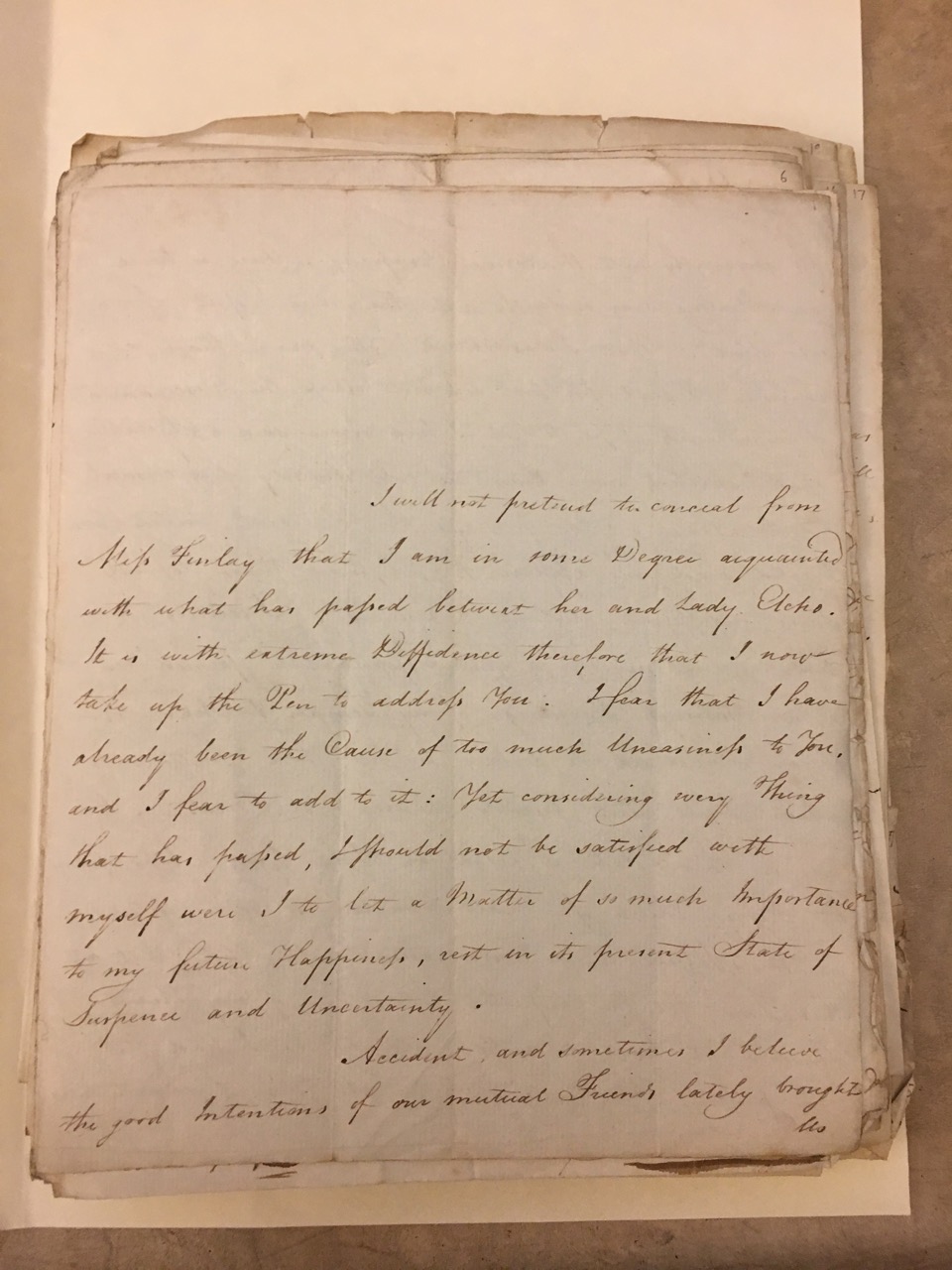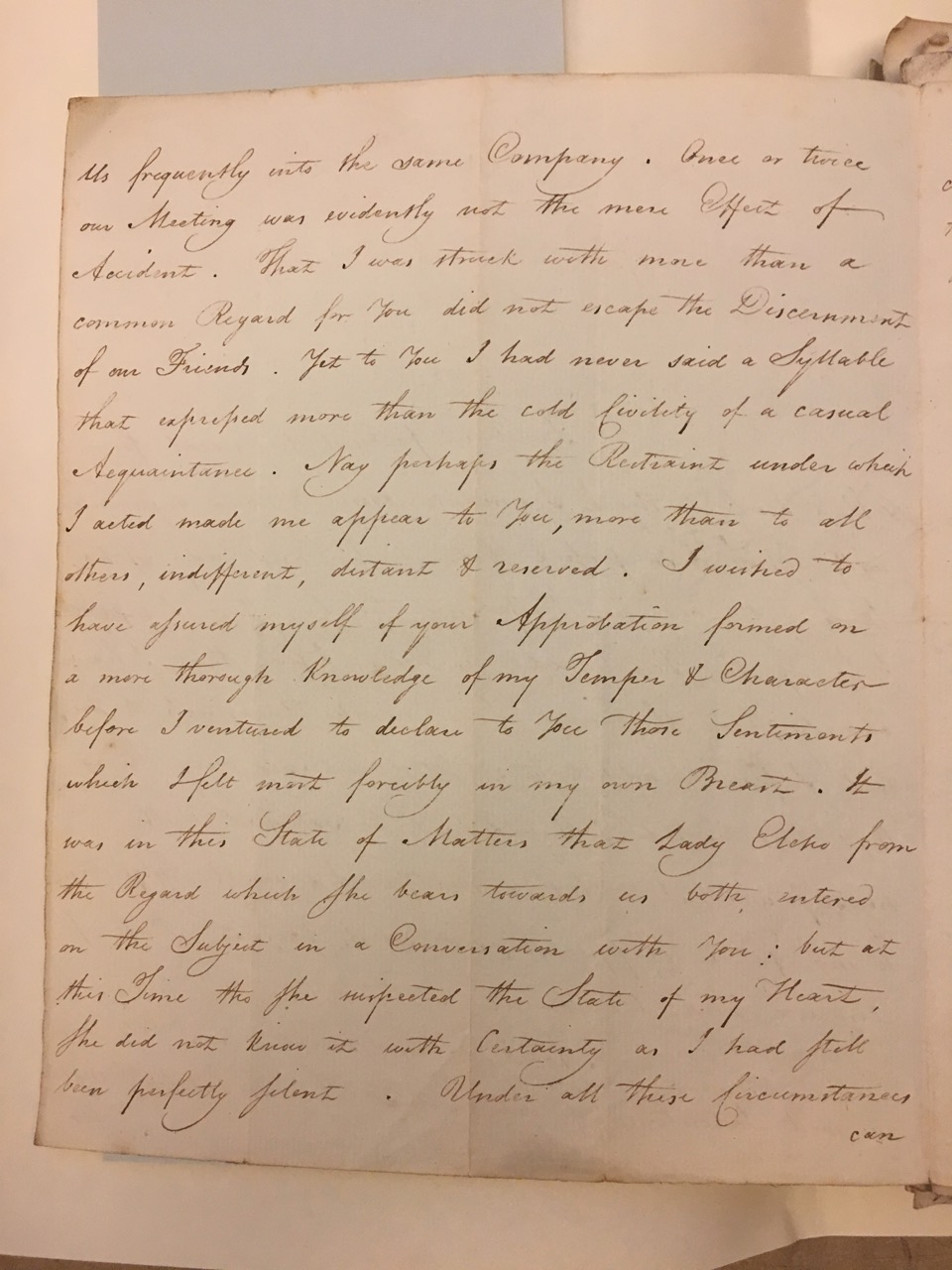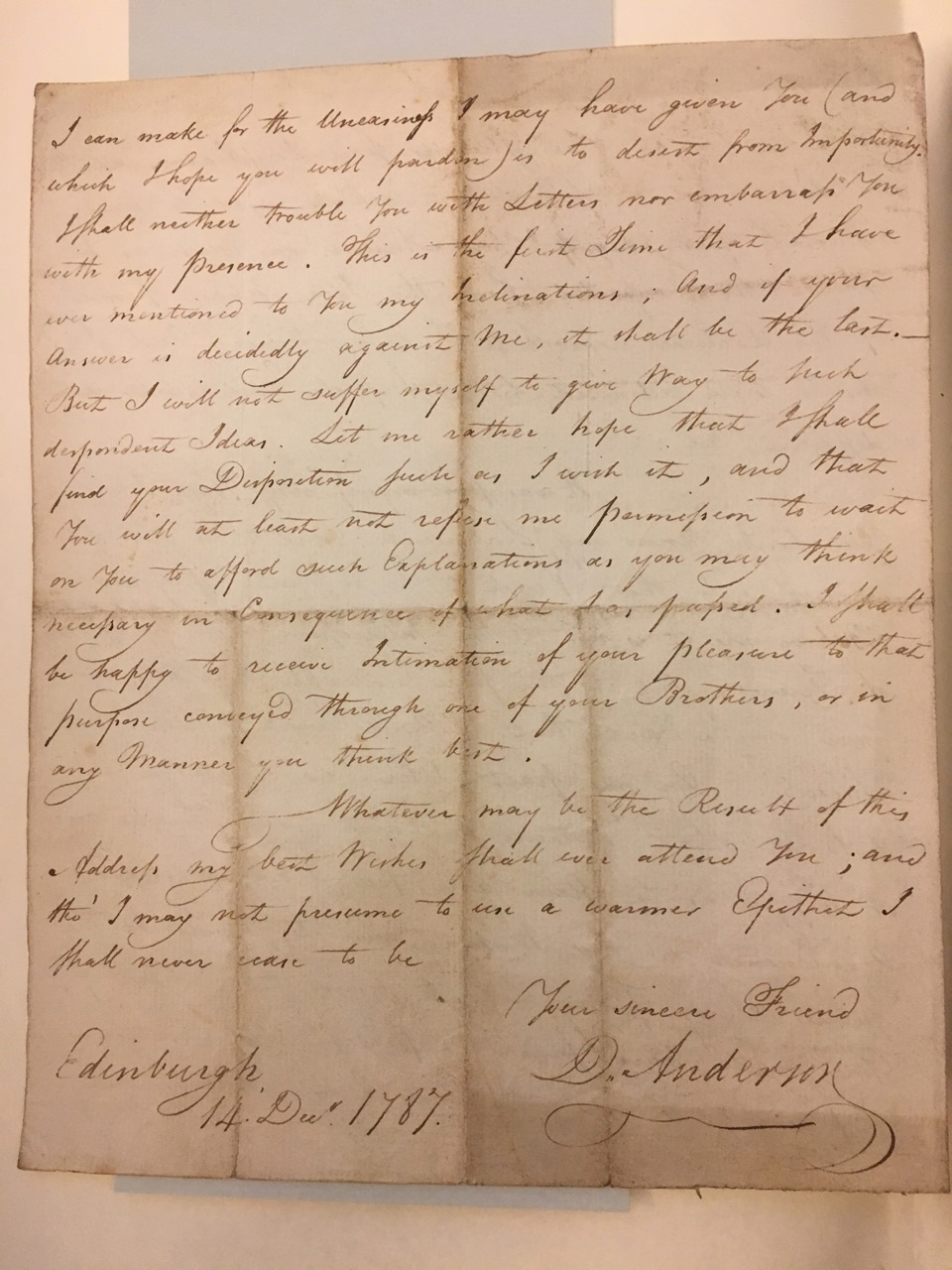236 - David Anderson to Christina Findley (Anderson), 14 December 1787
- Transcription
- Letter Details
- How to Cite
Image 1 of 3

Image 2 of 3

Image 3 of 3

I will not pretend to conceal from
Miss Finlay that I am in some Degree acquainted
with what has passed between her and Lady ?Acto.
It is with extreme Diffidence therefore that I now
take up the Pen to address You: I fear that I have
already been the Cause of too much uneasiness to You,
and I fear to add to it: Yet considering every Thing
that has passed, I should not be satisfied with
myself were I to let a Matter of so much Importance
to my future Happiness, sent in its present State of
Suspence and Uncertainty.
Accident and sometimes I believe
the good Intentions of our mutual Friends lately brought
us
[f.1v]
us frequently into the same Company. Once or twice
our Meeting was evidently not the mere Effect of
Accident. That I was struck with more than a
common Regard for You did not escape the Discernment
of our Friends. Yet to You I had never said a Syllable
that expressed more than the cold Civility of a casual
Acquaintance. Nay perhaps the Restraint under which
I acted made me appear to You, more than to all
others, indifferent, distant & reserved. I wished to
have assured myself of your Approbation formed on
a more thorough knowledge of my Temper & Character
before I ventured to declare to you those sentiments
which I felt forcibly in my own Breast. It
was in this State of Matters that Lady ?Acto from
the Regard which she bears towards us both entered
on the Subject in a Conversation with you: but at
this Time tho she suspected the State of my Heart,
she did not know it with Certainty as I had still
been perfectly silent. Under all these Circumstances
can
[f.2]
can I wonder at your Showing some Displeasure at
the xxx Mention of a Subject which ought to have
originated from myself? Your Answer was such as I
should have expected from the Idea I have formed
of the Delicacy of Miss Finlay’s Mind. And I
should have admired her less if she had given a
different one.
It was from myself only that I wished
you should know my Sentiments: and it is still from
yourself only that I wish to be informed of yours.
Believe me, it is not to the intercession or to the advice
of Friends, but to the pure unbiased Dictates of
your own Mind that I should wish to owe my
Success. On my part I have no Hesitation in
declaring that nothing on Earth would make me
so happy as to obtain your free & uninfluenced
acquiescence in my Wishes, and it should be the
future Study of my Life to deserve it. But if
You Should have formed a fixed Determination
unfavourable to me, the best & only attonement
I
[f.2v]
I can make for the Uneasiness I may have given You (and
which I hope you will pardon) is to desert from Importunity.
I shall neither trouble you with Letters nor embarrass You
with my Presence. This is the first Time that I have
ever mentioned to you my Inclinations; and if your
answer is decidedly against me, it shall be the last.
But I will not suffer myself to give Way to such
despondent Ideas. Let me rather hope that I shall
find your Disposition such as I wish it, and that
You will at least not refuse me Permission to wait
on you to afford such Explanations as you may think
necessary in consequence of what has passed. I shall
be happy to receive Intimation of your pleasure to that
purpose conveyed through one of your Brothers, or in
any Manner you think best.
Whatever may be the Result of this
Address my best Wishes shall ever attend You; and
tho’ I may not perceive to use a warmer Epiphet I
shall never cease to be
Your sincere Friend
Edinburgh
14 Decr 1787.
I will not pretend to conceal from
Miss Finlay that I am in some Degree acquainted
with what has passed between her and Lady ?Acto.
It is with extreme Diffidence therefore that I now
take up the Pen to address You: I fear that I have
already been the Cause of too much uneasiness to You,
and I fear to add to it: Yet considering every Thing
that has passed, I should not be satisfied with
myself were I to let a Matter of so much Importance
to my future Happiness, sent in its present State of
Suspence and Uncertainty.
Accident and sometimes I believe
the good Intentions of our mutual Friends lately brought
us
[f.1v]
us frequently into the same Company. Once or twice
our Meeting was evidently not the mere Effect of
Accident. That I was struck with more than a
common Regard for You did not escape the Discernment
of our Friends. Yet to You I had never said a Syllable
that expressed more than the cold Civility of a casual
Acquaintance. Nay perhaps the Restraint under which
I acted made me appear to You, more than to all
others, indifferent, distant & reserved. I wished to
have assured myself of your Approbation formed on
a more thorough knowledge of my Temper & Character
before I ventured to declare to you those sentiments
which I felt forcibly in my own Breast. It
was in this State of Matters that Lady ?Acto from
the Regard which she bears towards us both entered
on the Subject in a Conversation with you: but at
this Time though she suspected the State of my Heart,
she did not know it with Certainty as I had still
been perfectly silent. Under all these Circumstances
can
[f.2]
can I wonder at your Showing some Displeasure at
the xxx Mention of a Subject which ought to have
originated from myself? Your Answer was such as I
should have expected from the Idea I have formed
of the Delicacy of Miss Finlay’s Mind. And I
should have admired her less if she had given a
different one.
It was from myself only that I wished
you should know my Sentiments: and it is still from
yourself only that I wish to be informed of yours.
Believe me, it is not to the intercession or to the advice
of Friends, but to the pure unbiased Dictates of
your own Mind that I should wish to owe my
Success. On my part I have no Hesitation in
declaring that nothing on Earth would make me
so happy as to obtain your free & uninfluenced
acquiescence in my Wishes, and it should be the
future Study of my Life to deserve it. But if
You Should have formed a fixed Determination
unfavourable to me, the best & only atonement
I
[f.2v]
I can make for the Uneasiness I may have given You (and
which I hope you will pardon) is to desert from Importunity.
I shall neither trouble you with Letters nor embarrass You
with my Presence. This is the first Time that I have
ever mentioned to you my Inclinations; and if your
answer is decidedly against me, it shall be the last.
But I will not suffer myself to give Way to such
despondent Ideas. Let me rather hope that I shall
find your Disposition such as I wish it, and that
You will at least not refuse me Permission to wait
on you to afford such Explanations as you may think
necessary in consequence of what has passed. I shall
be happy to receive Intimation of your pleasure to that
purpose conveyed through one of your Brothers, or in
any Manner you think best.
Whatever may be the Result of this
Address my best Wishes shall ever attend You; and
tho’ I may not perceive to use a warmer Epithet I
shall never cease to be
Your sincere Friend
Edinburgh
14 Decr 1787.
David Anderson to Christina Findley (Anderson), 14 December 1787
A long declaring letter from David, describing ‘those Sentiments which I felt most forcibly in my own Breast’. Discussion of their meetings, occasionally facilitated by friends, his emotions and his fears of expressing them openly, and the beginnings of courtship.
Anderson Papers
82675 1-2
British Library
1787
12
14
[Edinburgh, Scotland]
[Scotland]
To Cite this Letter
David Anderson to Christina Findley (Anderson), 14 December 1787, 14121787: British Library, Anderson Papers, 82675 1-2
To Cite this Edition
Material Identities, Social Bodies: Embodiment in British Letters c.1680-1820. Compiled by: Karen Harvey, Helen Esfandiary, Sarah Fox, Emily Vine, University of Birmingham. Project funded by the Leverhulme Trust (2021-2025, Ref. RPG-2020-163), https://socialbodies.bham.ac.uk.